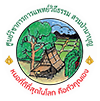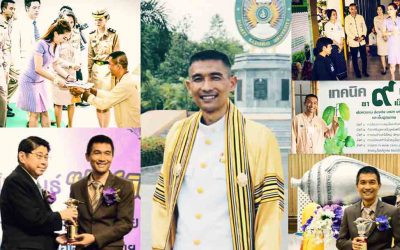เภสัชวัตถุพรรณนาในสวน ป่า นา ที่สัมพันธ์กับบุญของผู้สูงอายุ ในประเทศไทยและสาธารณรัฐประชาธิปไตยประชาชนลาว
ผุสดี เจริญไวยเจตน์
วิทยานิพนธ์นี้เป็นส่วนหนึ่งของการศึกษาตามหลักสูตรปรัชญาดุษฎีบัณฑิต
สาขาวิชายุทธศาสตร์การพัฒนาภูมิภาค (สาธารณสุขชุมชน)
คณะกรรมการบัณฑิตศึกษา มหาวิทยาลัยราชภัฏสุรินทร์
พ.ศ. 2561
ลิขสิทธิ์ของมหาวิทยาลัยราชภัฏสุรินทร์
- ชื่อเรื่อง : เภสัชวัตถุพรรณนาในสวน ป่า นา ที่สัมพันธ์กับบุญของผู้สูงอายุในประเทศไทยและสาธารณรัฐประชาธิปไตยประชาชนลาว
- ผู้วิจัย : ผุสดี เจริญไวยเจตน์
- ปริญญา : ปรัชญาดุษฎีบัณฑิต
- สาขาวิชา : ยุทธศาสตร์การพัฒนาภูมิภาค (สาธารณสุขชุมชน)
- อาจารย์ที่ปรึกษา : อาจารย์ ดร.อุษา กลมพันธ์ รองศาสตราจารย์ ดร.อัจฉรา ภาณุรัตน์ และ ผู้ช่วยศาสตราจารย์ ดร.กิ่งเพชร ส่งเสริม
บทคัดย่อ
การศึกษาวิจัยเรื่องเภสัชวัตถุพรรณนาในสวน ป่า นา ที่สัมพันธ์กับบุญของผู้สูงอายุในประเทศไทยและสาธารณรัฐประชาธิปไตยประชาชนลาว ได้บูรณาการระเบียบวิธีวิจัยเชิงคุณภาพ มานุษยวิทยาทางการแพทย์ การเก็บข้อมูลใช้การสัมภาษณ์แบบเจาะลึกกับกลุ่มผู้ให้ข้อมูลหลักคือ หมอพื้นบ้าน ผู้นำชุมชน พระสงฆ์ ผู้สูงอายุและผู้ที่เป็นสมาชิกในครอบครัวของผู้สูงอายุ และประชาชนทั่วไป พบข้อมูลอิ่มตัวที่ผู้ให้ข้อมูลหลักชาวไทย 35 คน และชาวสาธารณรัฐประชาธิปไตยประชาชนลาว 25 คน และทำการวิจัยเชิงปริมาณ โดยนำข้อมูลที่ได้จากการวิจัยเชิงคุณภาพมาสรุปประเด็นสร้างข้อกระทงคำถามและประมวลผลด้วยวิธีการทางสถิติโดยการวิเคราะห์องค์ประกอบเชิงสารวจ (Exploratory Factor Analysis) โดยสำรวจกับกลุ่มเป้าหมายในประเทศไทยจำนวน 500 คน ประกอบด้วย ผู้สูงอายุที่มีอายุตั้งแต่ 60 ปีขึ้นไป ที่เข้าร่วมกิจกรรมบุญของชุมชนสวนป่านาบุญ หรือชุมชนชาวอโศก
ผลการศึกษาวิเคราะห์องค์ประกอบกับเภสัชวัตถุพรรณนาในสวน ป่า นา ที่สัมพันธ์กับบุญของผู้สูงอายุในประเทศไทย มีจำนวน 4 องค์ประกอบ ดังนี้
- การฟื้นฟู “สวน ป่า นา” โดยให้ผู้สูงอายุและลูกหลานใช้บุญกิริยาวัตถุ 10 ขับเคลื่อน จะมีผลปรากฏ ภูมิปัญญาการสร้าง การแบ่งปัน การให้ความหมาย และการเรียนรู้เรื่องเครื่องเทศ เครื่องยา จากทั้งภายในกายคน และสิ่งแวดล้อมภายนอก เพื่อเป็นเภสัชวัตถุ
- การเชื่อเรื่อง “กรรม” มีผลให้ลดเนื้อสัตว์เพื่อไม่เบียดเบียนชีวิตสัตว์และเพื่อปฏิบัติศีล 5 (อธิศีล) แล้ว จะเห็นคุณค่าการบริโภคพืชผักสวน ป่า นาเป็นโภชนบำบัดและสามารถใช้ไตรลักษณ์เป็นกลไกทำให้จิตและกายบำบัดโรคภัยด้วยตนเองได้
- เภสัชวัตถุพืช 9 รส และพืชให้ฤทธิ์ร้อน – เย็น เป็นภูมิรู้ที่ต้องมี สวน ป่า นาในนิเวศวิทยาวัฒนธรรมของผู้ทรงศีลสูงอายุ เพื่อการรองรับชุมชนบุญ และ
- บวร (บ้าน วัด โรงเรียน) เป็นกลไกการถ่ายทอดเทคโนโลยีการรักษาความชื้นระบบนิเวศของดินน้ำในสวน ป่า นาเพื่อผลิตยาสมุนไพรและสร้างไอระเหยจากพืชผักสวนครัวให้มีผลต่อสุขภาวะของผู้สูงอายุ
ผลการจัดทำบทเรียนการพัฒนาสุขภาพของผู้สูงอายุกลุ่มชาติพันธุ์ไทลาวในอนุภูมิภาค ลุ่มแม่น้ำโขงด้วยเภสัชวัตถุพรรณนาในสวน ป่า นา ที่สัมพันธ์กับบุญ ผู้วิจัยได้ดำเนินการถอดรหัสภูมิปัญญาที่สำคัญเกี่ยวกับการพัฒนาสุขภาพของผู้สูงอายุที่ได้จากการวิจัยเชิงคุณภาพ นำมาพิจารณาร่วมกับค่าน้ำหนักองค์ประกอบจากข้อคำถามที่ได้จากการใช้วิธีการทางสถิติวิเคราะห์องค์ประกอบเชิงสำรวจได้รหัสภูมิปัญญาจำนวน 8 รหัสหลัก ดังนี้ 1) ภูมิรู้เภสัชวัตถุ 2) ภูมิรู้สวนป่านาไร่ 3) เพิ่มศีล รักษาโรค 4) ศรัทธาสิ่งใด ๆ ที่รักษาโรคได้ 5) บุญกิริยาวัตถุ กลไกการฟื้นฟูสวน ป่า นา ไร้สารพิษ 6) บุญกิริยาวัตถุ กลไกการเผยแพร่ภูมิรู้สวนป่านาไร่ และภูมิรู้เภสัชวัตถุ 7) ความเชื่อเรื่องกรรม ก่อเกิดบุญกิริยาวัตถุ และ 8) พลัง “บวร” กลไกการถ่ายทอดภูมิรู้เพื่อการพัฒนาสุขภาพดี จากนั้นนำรหัสภูมิปัญญาดังกล่าวมาจัดกลุ่มแบ่งตามวัตถุประสงค์การใช้เป็นแนวทางการพัฒนาสุขภาพ 3 แนวทาง คือ ใช้เมื่อเจ็บป่วย ใช้ในชีวิตประจำวัน และใช้ในการเผยแพร่องค์ความรู้เพื่อพัฒนาชุมชนสุขภาพดี จากนั้นจัดทำเป็นบทเรียนเพื่อนำไปใช้ในการพัฒนาสุขภาพของผู้สูงอายุกลุ่มชาติพันธุ์ ไทลาวในอนุภูมิภาคลุ่มแม่น้ำโขงต่อไป
PHARMACEUTICAL MATERIALS DEPICTION IN GARDEN, FOREST, RICE FIELD RELATED TO MERIT OF THE ELDERLY IN THAILAND AND LAO PEOPLE’S DEMOCRATIC REPUBLIC
PHUSADEE CHAROENWAIYAJET
DOCTOR OF PHILOSOPHY PROGRAM IN REGIONAL DEVELOPMENT STRATEGIES SURINDRA RAJABHAT UNIVERSITY.
ACADEMIC YEAR. 2018.
ABSTRACT
Research concerning pharmaceutical materials depiction in garden, forest, rice field related to merit of the elderly in Thailand and Lao People’s Democratic Republic has integrated the order of qualitative research in the medical humanities. Data were collected by using the in-depth interview with the core group of informants, who were local doctors, community leaders and Buddhist monks, as well as the elderly and their family members and the general public, which found saturated at 35 Thai informants and 25 Laotian informants.
This was combined with quantitative research taking the qualitative data to summarize and create sections of questions and processing with statistical methods for an Exploratory Factor Analysis. The survey was held with 500 members of the target group in Thailand, comprising the elderly aged 60 upwards, who had participated in merit-making ceremonies of Buddhist Medicine or Asoke people.
The result of analyzing the components and the depiction of pharmaceutical materials in gardens, forests and rice fields relating to merit made by the elderly in Thailand found that there were 4 components as follows :
- Reviving “gardens, forests and fields” by getting the elderly and their offspring to use the 10 Items of Meritorious Action to drive things. The result appeared that the wisdom of creating, sharing and giving meaning, and learning about spices and medicines, both internally in people’s bodies and the external environment, to make pharmaceutical materials,
- The belief in karma had the effect on reducing meat so as not to trouble animals’ lives and to practice the 5 precepts (higher morality). They could see the value of consuming plants and vegetables from gardens, forests and rice fields as nutritional therapy. They could use the Tilakkana as a mechanism for their minds and to treat disease by themselves,
- As for the 9 flavors of pharmaceutical materials with hot or cold effects, it was required to have knowledge of gardens, forests and fields in the ecology and culture of the ethics-holding elderly to support the merit community,
- “Boworn” (Institutions of house, temple and school) were mechanisms to transfer technology to maintain moistness in ecosystems of soil and water in gardens, forests and fields to produce herbal medicine and respiration from the kitchen garden vegetables to have an effect on the health of the elderly.
The results of lessons on developing the health of the elderly in Thai and Laos groups of the Greater Mekong Sub region; by using pharmaceutical materials in gardens, forests and fields relating to merit, the researcher had carried out the unlocking of important wisdom concerning developing the health of the elderly from qualitative research.
This was combined with the values of weighted components from the questions obtained from the use of statistical methods in the Exploratory Factor Analysis. The 8 primary keys of wisdom were as follows:
1) knowledge of pharmaceutical materials,
2) knowledge of gardens, forests and fields,
3) Increasing morality and treating disease,
4) faith in that thing to cure disease,
5) Items of Meritorious Action, the mechanism to revive chemical toxin free-gardens, forests and fields,
6) Items of Meritorious Action, the mechanism to disseminate knowledge of gardens, forests and fields and pharmaceutical materials,
7) Belief in karma, to bring about Items of Meritorious Action and
8) The power of “Boworn” the mechanism to transfer knowledge to develop good health. from there, these “keys of wisdom” were arranged in groups according to the objectives of being used to develop health in three forms: use in times of illness, use in everyday life and use in disseminating knowledge and developing a healthy community. From there it was arranged as a lesson, which was able to be used in further development of the health of the elderly in Thai and Laos groups of the Greater Mekong Sub region
วิธีใช้ Embed PDF
- กรุณากดลูกศร ซ้าย-ขวา ในการเปลี่ยนหน้า
- ถ้าหากตัวอักษรเล็ก-ใหญ่เกินไป กรุณากดเครื่องหมาย บวก-ลบ เพื่อปรับขยาย-ลดตัวอักษร
ประวัติผู้วิจัย
| ชื่อ –สกุล | นางสาวผุสดี เจริญไวยเจตน์ |
| วัน เดือน ปี เกิด | 28 มกราคม พ.ศ. 2518 |
| ที่อยู่ปัจจุบัน | บ้านเลขที่ 158 ม. 11 ถ.วิธานธรรมวัตร ตาบลทรงคะนอง อาเภอ พระประแดง จังหวัดสมุทรปราการ รหัสไปรษณีย์ 10130 |
| ตำแหน่งหน้าที่การงานปัจจุบัน | • ผู้สอบบัญชีรับอนุญาตแห่งประเทศไทย • จิตอาสาแพทย์วิถีพุทธ สวนป่านาบุญ 1 อาเภอดอนตาล จังหวัดมุกดาหาร |
| ประวัติการศึกษา | |
| พ.ศ. 2529 | • จบการศึกษา ประถมศึกษา โรงเรียนอาษาวิทยา จังหวัดสมุทรปราการ |
| พ.ศ. 2532 | • จบการศึกษา มัธยมศึกษาตอนต้น โรงเรียนวิสุทธิกษัตรี จังหวัดสมุทรปราการ |
| พ.ศ. 2535 | • จบการศึกษา มัธยมศึกษาตอนปลาย โรงเรียนสุรศักดิ์มนตรี กรุงเทพมหานคร |
| พ.ศ. 2539 | • จบการศึกษา บัญชีบัณฑิต มหาวิทยาลัยธรรมศาสตร์ กรุงเทพมหานคร |
| พ.ศ. 2545 | • จบการศึกษา ปริญญาบริหารธุรกิจมหาบัณฑิต มหาวิทยาลัยธรรมศาสตร์ กรุงเทพมหานคร |
| พ.ศ. 2562 | • จบการศึกษา ปรัชญาดุษฎีบัณฑิต สาขายุทธศาสตร์การพัฒนา- ภูมิภาค (สาธารณสุขชุมชน) มหาวิทยาลัยราชภัฏสุรินทร์ จังหวัดสุรินทร์ |


